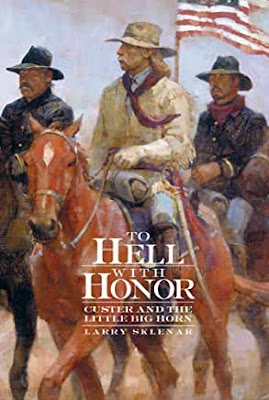While I did manage to read 11 books during August, a good part of my reading seemed to go more sluggishly than usual. I'm not sure if I simply made some poor choices this month or if it's more a problem with my general attitude. Whichever it was, I'm really looking forward to a fresh start in September...although that's the peak of hurricane season in this part of the country, so it could turn out to be an extra-interesting month. Looking at the ones I finished in August, I'm a bit surprised to see that six are novels and five are nonfiction because I don't usually read nonfiction in that kind of ratio to fiction.
- The Good Daughters - Joyce Maynard - Two very different families share a huge secret for over 50 years
- We Came, We Saw, We Left - Charles Wheelan - man travels around the world for 9 months with wife & 3 teens - Nonfiction
- To Hell with Honor - Larry Sklenar - Brilliant explanation of what happened at The Little Big Horn and who was responsible
- Stupid Things I Won't Do When I Get Old - Steven Petrow - writer vows to practice what he learned from watching his parents age
- The Woman in the Library - Sulari Gentill - Disappointing mystery using novel-inside-a-novel structure that is stupefyingly formulaic
- Real Tigers - Mick Herron - #4 in the terrific Slough House series
- A String of Beads - Thomas Perry - Jane Whitefield #8 - Jane hides he childhood Seneca best friend from cops and killers
- Bridge of Spies - Giles Whittell - Account of U-2 pilot Gary Powers, his capture by Russia and exchange for Russian spy
- Blood Safari - Deon Meyer - Second novel in Meyer's Lemmer series about a South African bodyguard
- In a Dry Season - Peter Robinson - Inspector Banks #10 - a case going back to World War II; Banks meets DS Annie Cabbot
- Packing My Library - Alberto Manguel - Argentinian author's 10 essays and 10 "digressions" on packing away his personal library
I think I'm a little disappointed with this lot because even some of my favorite crime writers didn't impress me all that much this month. I read four of my favorites this month: Mick Herron, Deon Meyer, Thomas Perry, and Peter Robinson. Of the four books of theirs, the only one that stands out to me as representative of their best work is Herron's Real Tigers, and based on that one's not-so-promising plot summary I was surprised by how much I liked it. I absolutely loved the first third of Meyer's Blood Safari, but it became a routine thriller after one of the book's two main characters was sent to hospital in a coma - where she stayed for almost the rest of the book. I "liked" Perry's A String of Beads right up until I realized that Jane Whitefield was going to be using the same evasion techniques that she uses in all of the novels featuring her and that she was simply teaching them to a new client. This is only the second Whitefield novel I've read, though, so maybe that criticism is premature. As for Robinson's 10th Inspector Banks novel, it is built around one of the things I like least in fiction: an author "telling" what happened rather than "showing it." In In a Dry Season, Robinson flashes back and forth via an unpublished manuscript that fills in most of the holes from the WWII portion of the novel. And that goes on for about ninety percent of the novel. It became tedious because the "manuscript author" wrote so passionlessly.
And then there were two 2-star books this month: the robotically written The Woman in the Library and the way-over-my-head Packing My Library. I had high hopes for the latter, even to purchasing an e-book copy of it, but it was a real slog for me, and I'm still not sure what I read...or why. The Woman in the Library is so formulaic that it could have been written by a software program. Before that one is over, just about every main character in the novel has been featured in the role of red herring. It just got silly sometimes.
My favorite book of the month turned out to be To Hell with Honor by Larry Sklenar, an in-depth study of exactly what must have happened at the Little Big Horn in 1876 when Custer and most of his 7th Calvary were destroyed. It is very well researched and explains how such a thing could have happened - along with whom was really responsible for the poor decisions made that day by the US Army leadership. It is a real eye-opener, and it's earned a permanent slot on my History bookshelf.
Now that I've come to the end of this month's reading recap, I realize just how "blah" a reading month I really had. Having had only one particularly outstanding book all month long means that September almost has to be better without even trying very hard.
As August ends, I'm at various stages of reading: Wuthering Heights by Emily Brontë, The Burgler (a 1954 noir novel by David Goodis, Isaac's Storm (Erik Larson's third book), The Three-Cornered War (a Civil War history by Megan Kate Nelson), and Leave the Grave Green by Deborah Crombie. Already, these seem to be going better than almost everything I finished it August.
Bye for now.
